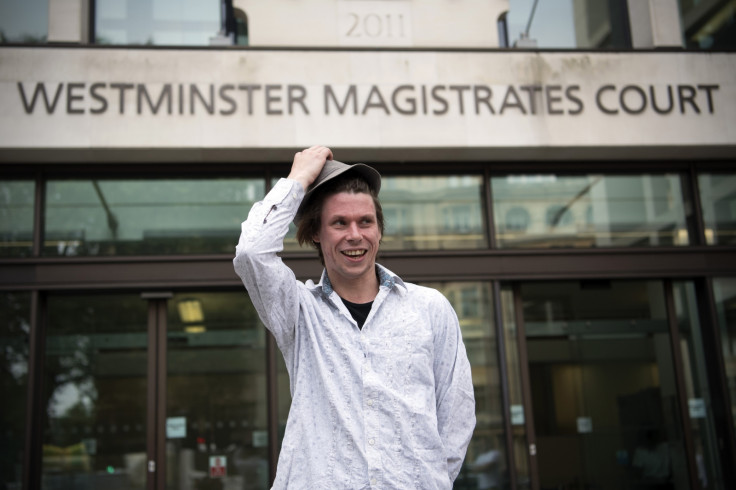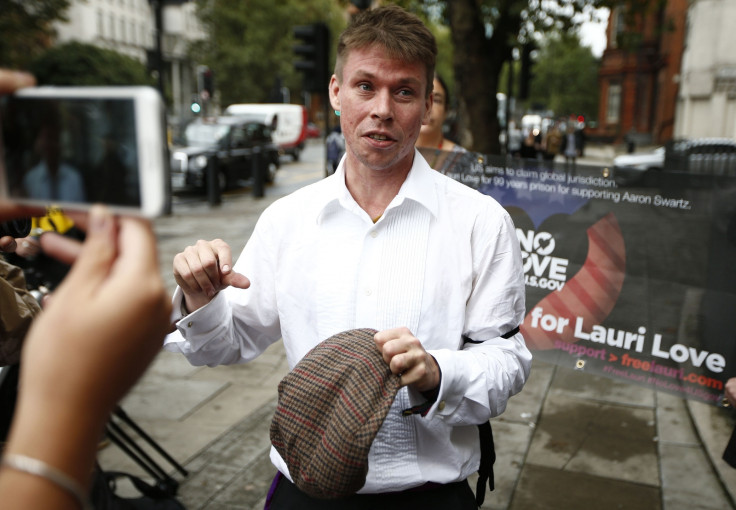The fight of Lauri Love: Hacker opens up about facing 99 years in prison and extradition nightmare
IBTimes UK exclusive: Love reveals all at a London mansion-turned-squat called 'The Occupation'.
Less than 10 minutes from Buckingham Palace, in a leafy and seemingly affluent London street, one seven-storey mansion is currently being occupied by squatters and self-ascribed anarchists. In one of its many large and graffiti-adorned rooms, sits Lauri Love.
Visiting the squat known as The Occupation, Love sits close to his laptop and taps away, sometimes stopping to light a cigarette. The building is huge, abandoned, with a tent-like structure made of branches built in one end of the room. "Take me home", a sign reads.
Downstairs, at the bottom of a grand staircase, is an assortment of squatters – friendly and engaging – convened in front of a well-lit fire to discuss a cannabis seizure on their street only a day prior. It instantly becomes clear there's more to Belgravia than royal residences.
Upstairs, Love tells IBTimes UK his story. He is a man most-wanted by the US government, which has accused him of hacking into the computer networks of the FBI, Department of Defense (DoD) and Nasa before stealing troves of confidential data.
He has been diagnosed with Asperger syndrome, depression and antibiotic-resistant eczema and, if convicted, legal experts say he will face up to 99 years behind bars. In a wide-ranging interview, he opened up about his case, previous wrangles and hopes for the future.
Love's fight
US investigators claim Love was part of #OpLastResort, a hacktivist-style campaign launched after the suicide of Aaron Swartz. Following alleged hacking activity between October 2012 and October 2013, he is now wanted in three separate States for alleged computer crimes.
His ongoing fight against extradition – the first real test of the "forum bar" enacted after the case of hacker Gary McKinnon – hit a snag in November 2016 after the UK Home Secretary, Amber Rudd, brushed off Love's health concerns and said he should be handed over the US.
"If I am put on a plane there is no light at the end of that tunnel," Love said.
"I will be kept locked up and put in prison for as long as they can get away with. The chances are that I won't emerge again because I will die, because of the violence [in US prisons] and my depression, Asperger's and suicidality.
"I will do everything at my disposal to avoid being kidnapped. If need be, that means taking matters into my own hands, which I can't talk about too much because it's a good excuse for them to lock me up. All of this was argued in my extradition hearings."

It was in October 2013 when Love was first arrested by the UK National Crime Agency (NCA), the British equivalent of the FBI, at his parent's house in Stradishall, Suffolk. No charges were brought at the time, however he was re-arrested on 15 July 2015 at the behest of American authorities, following the filing of indictments and extradition warrants.
Despite this, happening at the same time as a separate fight with the NCA over seized equipment, Love remains free. He has not been convicted of any crimes, instead he is stuck in a state of court-induced limbo, requesting a trial and potential conviction in the UK, that's if he is charged at all.
"Really what we are asking is 'please can I have a trial', he said. "I am asking what any suspect in the UK would expect, and that's to be in the UK in front of a jury of their peers. We are asking to be persecuted, but under some rules where it's semi-fair."
Love has long-alluded to the fact he is likely to commit suicide before seeing the inside of a US prison. "If I am put on a plane to the US, I will die," he said. "Anything in between getting on that plane and dying will just be protracted torture."
But the aim is for it never to come to such a dark conclusion. And his campaign has heavy support, not only from anarchists and hippies, but also in the form of Julian Assange, the founder of WikiLeaks and a swell of over a 100 politicians from the UK Parliament.
He said: "I don't want my parents or friends to be in the position where they worry about me being sent away and them never seeing me again.

"I do still hold a reasonable optimism this case will be resolved, the extradition will be refused and light will be shed on the systematic problems with the US justice system, some humble and modest ammunition for the people trying to reform that system.
"If that were to be the case I would consider the hardship I have been through to be worth it. I wouldn't want anyone else to go through this so I'm hoping that a line can be drawn. If this is the last time they try to do it to someone who has never been to the country for computer offences then that would be okay."
Destroy power not people
Love did have a message for the UK government. He believes it should not allow someone to be punished unless they have "due process and a fair hearing", not allow someone to be locked up for decades on a non-violent offence and recognise jurisdiction has to be limited.
One law he is accused of breaking is the notorious Computer Fraud and Abuse Act (CFAA), a piece of legislation Love describes as being "informed by the technology of the 70s and 80s and the mindset of the 50s and 60s." It has been used to prosecute numerous hackers in the past and is routinely criticised as being overly broad and hugely outdated.
Love also pointed to recent changes in how the US government is increasingly bringing hackers into the fold, with programmes like the so-called Hack the Pentagon. Ultimately, he said this evolution is only one more reason why the charges against him are so ridiculous.

"In this day and age, or five years down the line, someone could have demonstrated the very same alleged vulnerabilities [in federal systems] and be paid a five-figure sum for it. Instead the US government thinks I owe it millions of dollars," he said.
"The US government, like the bully in the playground, doesn't like having its pants being pulled down, but more sensible voices should have said 'we dodged a bullet' and 'lets maybe see how we can leverage the hacker community' instead of being at war with them.'"
The future remains uncertain, with another court date set for the end of this month. For now, Love sits calmly in front of a large banner that reads 'No extradition for Lauri Love'. His own laptop features the sticker Destroy Power Not People.
"Hopefully in five years I will be getting on with my life and this will be a chapter which has come to a close," he told IBTimes UK. "I can't be locked up and not have access to the internet, for me that would be worse than losing my vision.
"The way I have understood and interfaced with the world for two-thirds of my life has been through the internet. It's where I get my intellectual nourishment, it's where my friends and peers are, and it's how I developed a social identity. To lose that would be a whole part of my life cut off. Hopefully, in five years, I see myself still tapping away."
© Copyright IBTimes 2025. All rights reserved.






















